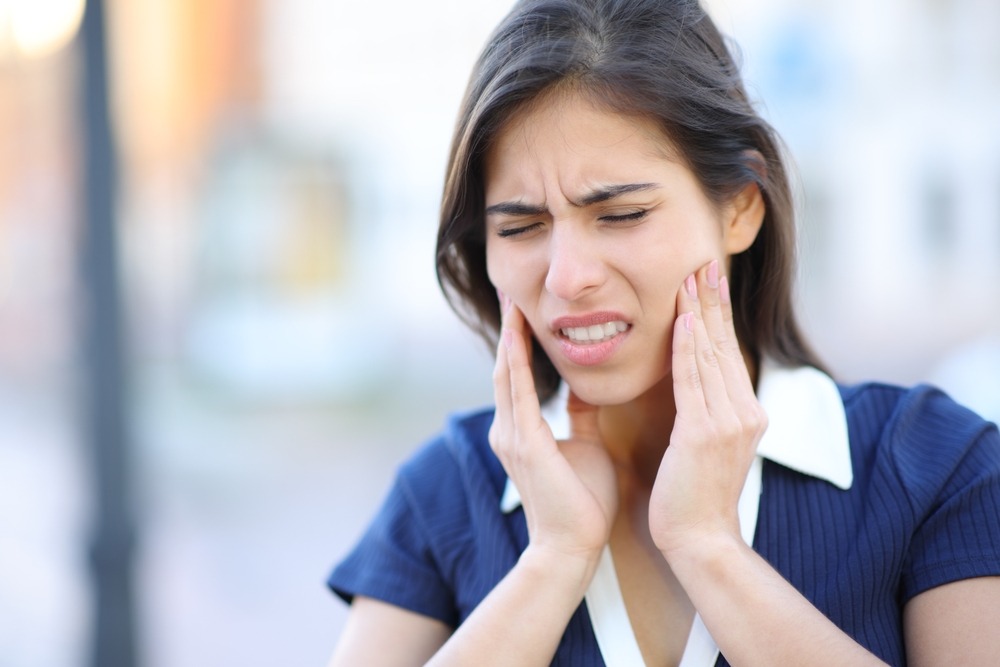
Blog Summary:
- Stress and anxiety can trigger bruxism (teeth grinding and jaw clenching), leading to jaw pain, headaches, and damaged teeth.
- Chronic stress weakens the immune system, increasing the risk of gum disease, cavities, and inflammation.
- Poor oral hygiene habits and unhealthy diet choices often accompany high-stress periods, compounding dental problems.
- Other stress-related oral issues include canker sores, cold sores, dry mouth, and bad breath.
- Dentists are seeing a significant rise in stress-related dental conditions since the pandemic, per ADA survey data.
- Strategies like wearing a custom night guard, practicing stress management, and maintaining oral hygiene can help protect your smile.
- Consulting your dentist early can prevent long-term damage caused by stress and grinding teeth.
According to a 2022 survey conducted by the American Psychological Association (APA), 76% of Americans report having experienced health impacts due to stress in the past month, and 35% report having experienced nervousness or anxiousness.
These numbers are even higher for young adults aged 18-24, sitting at around 66%. Clearly, stress and anxiety are common.
But what are the effects of all of this stress and anxiety? While stress is known to affect just about every system of the body, ranging from the cardiovascular system to the endocrine system and musculoskeletal system, you might not have thought about its effects on the teeth and mouth.
Below, we’ll explore some of the potentially surprising ways that stress can affect your mouth and teeth – along with what to do about it.
Can Stress Affect Your Teeth & Gums?
Yes. Stress and anxiety both can adversely affect the teeth and gums. In fact, according to a 2021 ADA survey, dentists have been seeing a marked increase in the number of patients they see who experience dental conditions caused by stress. In other words, stress isn’t just something that affects the teeth and gums; it’s something that’s causing more problems with the teeth and gums now than ever before.
Stress and Teeth Grinding
Stress and anxiety are well-known causes of bruxism, a medical term used to encompass both teeth grinding and jaw clenching, which are related.
While the link between both stress and clenching teeth, as well as stress and grinding teeth, is often overlooked, it shouldn’t be.
That’s because bruxism can not only cause dull headaches, jaw tenderness, and worn-down teeth, but also result in chipped or cracked teeth.

Other Surprising Stress-Related Oral Issues
Grinding teeth and stress are only part of the problem. Chronic stress and anxiety can also suppress your immune system, making your gums more vulnerable to inflammation, infection, and, over time, gum disease.
In other words, anxiety and stress teeth grinding is just the tip of the iceberg; stress also sets the stage for everything from inflammation to the development of cavities and even the loss of teeth.
When stress leads to poor dietary choices, increased use of alcohol and drugs, and skipped oral care routines (i.e. not brushing your teeth before bed), as it often does, these effects can multiply.
Other stress-related oral issues include:
- Canker sores
- Cold sores
- Dry mouth
- Bad breath
- And more
How to Stop Clenching Your Jaw & Protect Your Smile
Thankfully, you’re not powerless against stress and the many mouth-related maladies it can contribute to or cause. Here are five things you can do starting now to safeguard your teeth and mouth from stress-related issues:
- Get a Custom Nightguard: Wearing a dentist-fitted night guard while you sleep can help you protect your teeth against the effects of stress-related teeth grinding and jaw clenching. While OTC options are available, only custom guards offer a snug, comfortable fit and enhanced protection.
- Be Mindful During the Day: Try to be mindful of the position of your teeth in your mouth and keep them slightly apart when you’re not eating. This can help you decrease daytime clenching.
- Practice Stress Management: Activities that activate the relaxation response, from medication and yoga to deep breathing and physical exercise, can all help you more effectively cope with stress and decrease bruxism.
- Stay Consistent with Oral Hygiene: Try to stay as consistent as possible with your oral hygiene routine. Brush your teeth twice a day, floss at least once a day, and consider using a pH-balanced oral rinse.
- Consult Your Dentist: If you’re experiencing teeth clenching or grinding caused by stress, it’s time to talk to your dentist. Even if these issues are not yet causing headaches, muscle soreness, tenderness, or sensitive, worn-down teeth, it’s better to get ahead of these issues before they occur than to wait. And if they are already occurring, you deserve to deal with them sooner rather than later and reclaim a better quality of life.
Final Thoughts
As you’ve now learned, stress is affecting more and more Americans’ teeth and gums than ever before. But you don’t have to be a part of that trend. With the proper support and a little bit of intentionality, you can break the cycle and keep your smile strong.
Take control of your oral health starting now; Learn more in If Your Mouth Could Talk by Dr. Kami Hoss, where you can learn more about the powerful connection between your mouth and overall well-being.

